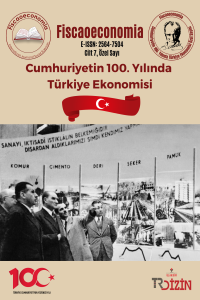Enflasyonun Tarihsel Belirleyenleri: Türkiye ve İkinci Dünya Savaşı
Historical Determinants of Inflation: Türkiye and the Second World War
Author(s): İsmail Altay, Gizel Busem Sayil, Avni Önder HanedarSubject(s): National Economy, Economic history, WW II and following years (1940 - 1949), Financial Markets
Published by: Ahmet Arif Eren
Keywords: The Second World War; Inflation; Black Market; Exchange Policy; Historical Political Economy;
Summary/Abstract: As Türkiye implemented an active neutrality policy in the Second World War, there were significant political and economic problems and risks. In this process, the government applied to diplomatic maneuvers not to join the military conflicts. At the same time, they took various policies to combat the economic problems created by the war. Compared with the combatants’ economy and policies during the war, i.e., the USA (United States of America) and United Kingdom, our study investigates why Türkiye faced a high inflation rate despite its absence of conflicts. Our results indicate that in this period, Türkiye had an underdeveloped economy with a newborn political regime, as exchange rate policy and black market-related reasons created an escalation of a price increase. It is important that inflation was initially created by the reduction of production and the financing deficits with money supply, as in the USA and UK. Moreover, according to the discoveries about the inflationist process in Türkiye, it can be suggested that the government’s stubborn policies about protecting the lira’s foreign value and other factors, such as expensive imports and black factors as a result of premium exchange rates are impactful for this process.
Journal: Fiscaoeconomia
- Issue Year: 7/2023
- Issue No: spec. 1
- Page Range: 260-282
- Page Count: 23
- Language: Turkish

